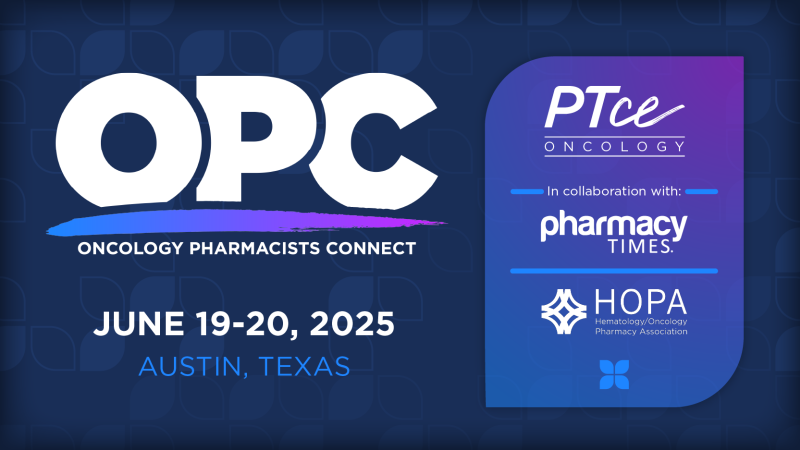News
Article
Pharmacy Practice in Focus: Oncology
Real-World Data on Expanding Step-Up Dosing Administration of Bispecific T-Cell Engagers in the Outpatient Setting
Fact checked by:
Key Takeaways
- Bispecific T-cell engagers (BiTEs) show efficacy in hematologic malignancies and solid tumors, traditionally administered inpatient due to toxicity concerns.
- Step-up dosing (SUD) regimens aim to mitigate risks like cytokine release syndrome, exploring outpatient feasibility and safety.
This abstract will be presented at the Oncology Pharmacists Connect (OPC) meeting in Austin, Texas, from June 19 to 20, 2025.
Emilie Aschenbrenner, PharmD, BCOP, and Megan May, PharmD, BCOP, FHOPA, FAPO, will present an encore abstract titled "Real-World Data on Expanding Step-Up Dosing Administration of Bispecific T-Cell Engagers in the Outpatient Setting" at the 2025 Oncology Pharmacists Connect (OPC) meeting, taking place in Austin, Texas, from June 19 to 20.
Bispecific T-cell engagers could revolutionize oncology treatment. | Image Credit: © Love Employee - stock.adobe.com

Originally presented at the 2025 Pacific Coast Reproductive Society Annual Meeting in Indian Wells, California, the abstract highlights a real-world evaluation of outpatient step-up dosing (SUD) protocols for bispecific T-cell engagers (BiTEs). The authors examined the safety, feasibility, and toxicity management of delivering both SUD and target doses in outpatient settings, offering institutional guidance for optimizing patient care and reducing hospitalization burden.
Abstract
Background
Bispecific T-cell engagers (BiTEs) have demonstrated promising clinical efficacy in treating hematologic malignancies and, more recently, solid tumors. Traditionally administered in inpatient or observation settings due to concerns of cytokine release syndrome (CRS) and other acute toxicities, step-up dosing (SUD) regimens have emerged as a strategy to mitigate these risks. However, the feasibility and safety of expanding these regimens to outpatient (OP) settings remain underexplored. In an effort to transition BiTE administration to the OP setting and reduce hospitalization and reimbursement burdens, we implemented an institutional protocol at our respective institutions to deliver both SUD and target doses in the OP setting.
Objectives
This study aims to evaluate the safety and feasibility of administering SUD for BiTEs in the OP setting for real-world patients.
Methods
This retrospective study will utilize electronic medical records from Froedtert & the Medical College of Wisconsin and Baptist Health Lexington to evaluate the administration of BiTE SUD in the OP setting. Data will be collected on patient demographics, dosing schedules, incidence and grade of CRS, the need for subsequent hospitalization, and overall treatment outcomes. Safety assessments will be based on the Common Terminology Criteria for Adverse Events and the American Society for Transplantation and Cellular Therapy consensus criteria.
Results
Data will include toxicity management in the OP setting (eg, rates and grades of CRS/immune effector cell–associated neurotoxicity syndrome, deferred admissions, etc), an algorithm for appropriately selecting patients for OP administration, and a specific OP SUD treatment protocol.
Conclusions
We will present data on patients receiving BiTE SUD in the OP setting. Our collective guidelines emphasize OP administration and management for appropriately selected patients, enabling more efficient use of health care resources while ensuring patient safety.
About the 2025 OPC Meeting

At this year’s OPC meeting, attendees will have the opportunity to showcase clinical research and practice management insights or explore the latest advancements in oncology pharmacy during the poster session and networking reception. These events foster innovation, collaboration, and professional growth within the oncology pharmacy community. Participants can present their work, exchange ideas, and connect with leaders in the field during these networking opportunities.
Prior to the start of OPC on June 19, participants are invited to attend the Hematology/Oncology Pharmacy Association (HOPA) BCOP Program in person on June 18. HOPA has selected 4.0 CE hours from BCOP Updates 2024 and the Annual Conference 2025, featuring topics such as acute leukemia, cellular therapy for solid tumors, and the pharmacist’s role in serious illness conversations. Additional information is available here.

Newsletter
Stay informed on drug updates, treatment guidelines, and pharmacy practice trends—subscribe to Pharmacy Times for weekly clinical insights.






